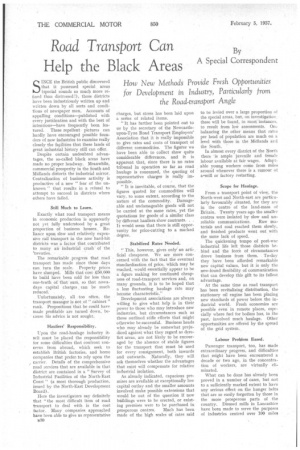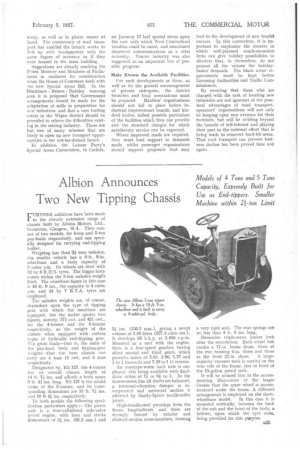Road Transport Can Help the Black Areas
Page 44

Page 45

If you've noticed an error in this article please click here to report it so we can fix it.
By A Special Correspondent
How New Methods Provide Fresh Opportunities for Development in Industry, Particularly from the Road-transport Angle SINCE the British public discovered that it possessed special areas (special sounds so much more refined than distressed ?), those districts have been industriously written up and written down by all sorts and conditions of newspaper men. Accounts of appalling conditions—published with every justification and with the best of intentions—have frequently been featured. These repellent pictures can hardly have encouraged possible founders of new industries to examine really closely the facilities that these lands of great industrial history still can offer.
Despite certain undoubted advantages, the so-called black areas have made no proper headway. Meanwhile, commercial prosperity in the South and Midlands distorts the industrial mirror. Centralization of business activity is productive of a new "fear of the unknown " that results in a refusal to attempt to succeed in districts where others have failed.
Still Much to Learn.
Exactly what road transport means in economic production is apparently not yet fully understood by a great proportion of business houses.: Reliance upon slow and relatively expensive rail transport in the now hard-hit districts was a factor that contributed to many in industrial crash of the 'twenties.
The remarkable progress that road transport has made since those days can turn the scale. Property prices have slumped. Mills that cost 250,000 to build have been sold for less than one-tenth of that' sum, so that nowadays capital charges _ can be much reduced.
Unfortunately, all too often, the transport manager is not of " cabinet " rank. Propositions that he could have made profitable are turned down, because his advice is not sought.
Hauliers' Responsibility.
Upon the road-haulage industry itself must be placed the responsibility for some difficulties that confront concerns from abroad, which seek to establish British factories, and home companies that prefer, to rely upon the carrier. Details of the comprehensive road services that are available in that district are contained in a "Survey of Industrial Facilities of the North-East Coast" (a most thorough production. issued by the North-East Development Board).
Here the investigators say definitely that "the most difficult item of road transport to deal with is the cost factor. Many companies approached have been able to give us representative
1330
charges, but stress has been laid upon a series of related items.
"It, has further been pointed out to Us by the secretary of the Newcastleupon-Tyne Road Transport Employers' Association that it is really impossible to give rates and costs of transport of different commodities. The figures we have been able to collect show quite considerable differences, and it is apparent that, since there is no rates tribunal in operation so far, as road haulage is concerned, the quoting of representative charges is really im
possible. • " It is inevitable, of course, that the figures quoted for commodities will vary, to some extent, according to the nature of the commodity. Damageable and undamageable goods will not be carried at the same rates, yet the quotations for goods of a similar class by different hauliers show contrasts. . . It would seem that there is still opportunity for price-cutting to a marked degree.
Stabilized Rates Needed.
"This, however, gives only' an arti-, ficial cheapness. We are more concerned with the fact that the eventual standardization of price, which may be reached, would essentially appear to be a figure making for continued cheapness of road-transport services and, on many grounds, it is to be hoped that a less fluctuating haulage rate may become characteristic."
Development associations are always willing to give what help is in their power to those who may introduce new industries, but circumstances such as those outlined stifle efforts that might otherwise be successful. Business heads who may already be somewhat prejudiced against what they regard as derelict areas, are not likely to be encouraged by the absence of stable figures for the transport that must be used for every consignment, both inwards and outwards. Naturally, they will ask themselves whether the advantages that exist will compensate for relative industrial isolation.
As already indicated, capacious premises are available at exceptionally low capital outlay and the smaller amounts involved make possible extensions that would be out of the question if new buildings were to be erected, or existing premises were to be purchased in prosperous centres. Much _has been made of the high scales of rates said to be levied over a large proportion of the special areas, but, on investigation these will be found, in most'instances, to result from lo' assessments, One balancing the other means that rates per head of population are much on a level with those in the Midlands mid the South.
In almost every district of the North there is ample juvenile and female labour available at fair wages. Adaptable young workers come from miles around whenever there is a rumour of amill or factory restarting.
Scope for Haulage.
From a transport point of view, the North-west and North-east are particularly favourably situated, for they are in the centre of the land-mass of Britain. Twenty years ago the smaller centres were isolated by slow and un
reliable communications. Raw materials and coal reached them slowly. and finished products went out with the same lack of speed.
The quickening tempo of post-war industrial life left those districts behind and the force of circumstances drove business from them. To-day they have been afforded remarkable new capital values, but it is only the new-found flexibility of communication that can develop this gift to its fullest advantage.
At the same time as road transport has been revitalizing distribution, the stationary oil engine has been placing new standards of power before the industrial world. Fresh economies are possible even in remote places, especially where fuel for boilers has, in the past, involved much haulage. Other opportunities are offered by the spread of the grid system.
Labour Problem Eased.
Passenger transport, too, has made extraordinary progress, and difficulties that might have been encountered a decade or two ago, in the concentration of workers, are virtually eliminated.
What can be done has already been proved in a number of cases, but not to a sufficiently marked extent to have any serious effect on the hunger belts that are so easily forgotten by those in the more prosperous parts of the country. Disused mills in Lancashire have been made to serve the purposes of industries centred over 100 miles
away, as well as in places nearer at hand. The consistency of road transport has enabled the branch works to link up with headquarters with the same degree of accuracy as if they were housed in the same building.
Suggestions are already reaching the Prime Minister and Members of Parliament in readiness for consideration when the House of Commons deals with the new Special Areas Bill. In the Blackburn Nelson Burnley weaving area it is proposed that Government arrangements should be made for the adaptation of mills in preparation for new industries, and that a vast trading estate in the Wigan district should be provided to relieve the difficulties existing in the mining industry. Those are but two of many schemes that are likely to open up new transport opportunities in the not-far-distant future.
. In addition the Labour Party's Special Areas Commission, in Carlisle. on January 13 laid special stress upon the ease with which West Cumberland troubles could be cured, and mentioned improved communications as a vital necessity. Tourist industry was also suggested as an important line of possible progress.
Make Known the Available Facilities.
For such developments as these, as well as for the general encouragement of private enterprise, the district branches and local associations must be prepared. Hauliers' organizations should not fail to place before industrial improvement boards, and kindred bodies, fullest possible particulars of the facilities which they can provide and the standard charges for which satisfactory service can be expected.
• Where improved roads are required, they must lend support to demands made, whilst passenger organizations should support proposals that may lead to the development of new tourist centres. In this connection, it is important to emphasize the manner in which well-planned coach-excursion links can give holiday possibilities to districts that, in themselves, do not possess all the virtues the holidaymaker demands. The black areas' requirements must be kept before Licensing Authorities 'and Traffic Commissioners.
By ensuring that those who are charged with the task of locating new industries are not ignorant of the practical advantages of road transport, operators' organizations will not only be keeping open new avenues for their members, but will be striding beyond the bounds of self-interest and playing their part in the national effort that is being made to resurrect hard-hit. areas. That road transport can prevent business decline has been proved time and again.




























































































